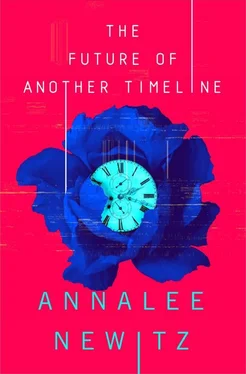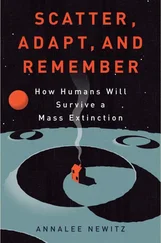Morehshin nodded eagerly. “Comstock must be stopped. His laws are at the root of the divergence. He’s going to inspire similar men in Europe.”
“I still don’t understand why Comstock is so important to these travelers.” Anita fiddled with a cube of cheese.
“He’s some kind of inspiration to them—”
I had more to say, but Morehshin cut me off. “He put men in charge of reproduction. Do you understand? That is too much power for any one group.”
Her point wasn’t nuanced, but I knew what she was getting at. “Morehshin is right. Comstock is making it illegal for people to have agency over their futures. Over the future of the species, even.” I thought back to Elliot’s pamphlet about how women’s inferiority was simply a matter of evolutionary biology. According to Morehshin’s hints, her present was ruled by people using science to control reproduction in line with the Comstock Laws.
C.L. sipped wine and shook their head. “None of this will matter if the Comstockers destroy the machine at Raqmu. I think they’re back there in the Ordovician, hacking on it.”
At that moment a spray of water hit the window, and I felt a burst of excruciating double memories. Beth was dead, her suicide a needle in my gut; and she was alive, saying she never wanted to see me again. Calling me a liar. An unfamiliar feeling of shame burrowed into my chest. Was I really going to organize anti-Comstock protests while the Machines were in danger and the timeline froze?
I pondered our options. I understood edits and reversions, merging conflicts and orthogonal deletions. But I couldn’t quite wrap my mind around how a Machine shutdown would propagate across the timeline. “Aren’t we technically in a version of the timeline where they failed?” I asked. “I mean, C.L. saw the cuts and the Machine is still working.”
“It’s a good question, and all I have is a hypothesis right now.” C.L. set down their wineglass. “What I saw is probably part of an extreme kind of merging conflict. My guess is that there are many divergences that split at some point before those cuts were made. We’re in a version where they fail but we’re getting closer and closer to one where they succeed. That’s why we’re seeing those interface bugs with increasing frequency. Essentially, those are signs that we’re living in a timeline where the Machines are being damaged. Soon, we could be in one where the Machines don’t work at all.”
“How soon?” Anita was troubled.
“Based on my readings, I’d say six months to a year. There seems to be a regular progression to their edits. But they could accidentally hit the right button tomorrow. I suspect the mechanism is a lot more complicated than that, but you never know.”
Anita put her chin on her fists. “We have to travel back to the moment right before they make those cuts and stop them. That way we revert back to a timeline where the Machines are undamaged.”
C.L.’s face was grave. “Are we going to do what Hugayr told us?”
“No,” I replied firmly. “We can stop them some other way.”
Morehshin gave me side-eye. “What will we do? Talk them out of it?”
“I think we can agree that whatever we do, a mission like this could be a one-way trip for some of us,” Anita said. “Or all of us.”
As her words sank in, I realized this might be our last chance to stop Comstock. “We wouldn’t need more than six months to do our edit here in 1893. Once we’ve done it, we can face whatever meets us in the Ordovician.”
“None of that will matter if the Comstockers control the Machine.” C.L. was getting angry.
“It will matter if we don’t make it back from the Ordovician.” Emotion had winnowed my voice down to a whisper. “I want to leave a better timeline behind. Not just an open timeline, but one where people who are not men can control the means of reproduction.”
Morehshin grabbed my hand inside her fist and I felt a hardness in her palm. “I will go with you. Let us defeat Comstock before dealing with the men who are sabotaging Machines.”
“It’s risky.” Anita exchanged glances with C.L.
“All of this is risky. Let’s finish the edit that we began at the Expo.” I was pleading now. “Maybe that will propagate forward and eliminate our Comstockers.”
“That sounds like a Great Man view of history. Stopping Comstock doesn’t mean you destroy the social movement that made him. We have to tap down to the Ordovician in six months.” Anita sounded doubtful, but I could tell she was coming around.
C.L. was unconvinced. “I’m going to stay here to keep monitoring the Machine, and if the emissions reach dangerous levels I’m going back there to… to do something.”
Anita cut them off. “I’ll stay here with you, C.L. If it comes to that, I’ll go with you. Let’s use 1893 as our home time, so neither of us is too far ahead of Tess when we get back to 2022.”
“Yes. When we get back to 2022,” I affirmed. “That will be a lucky edit.” As I mouthed the cliché, I realized I’d never thought about its actual meaning. A lucky edit was an event out of our control, the side effect of a fungible timeline, sometimes good and sometimes bad. But of course there was no such thing as luck. There were only deliberate revisions, hard-won changes, and their unintended consequences. A headache worked its way down my neck and beneath my shoulder blades. I needed sleep.
Everyone agreed it was time to turn in. Morehshin took the bedroom with C.L. and I rolled myself up in a thick rug next to Anita. We had a cubby next to the dining room to ourselves.
“Anita, I need to tell you something.” I couldn’t keep the anxiety out of my voice.
She propped herself up on one elbow. “Sounds serious.”
“You know when I told you guys about seeing that Comstocker back at that concert in 1992? Well… I did something else while I was there.”
“Did you make an edit?”
“No. I mean, yes… but that was later. My younger self was at the concert, and I felt fine after seeing her. So… then I snuck back upstream. From Flin Flon once, and then a couple nights ago from ancient Raqmu. I changed something in my past.”
“Tess.” I could tell she was biting back what she wanted to say.
“I know. It was stupid. But it seemed… I don’t know. I thought it would be okay. But it wasn’t. And now I feel really, really awful. I’m in a lot of pain.”
“Oh fuck. You need to tell me everything.”
I put my head in my hands. For my whole adult life, I’d striven to make significant edits. I’d dreamed of saving Beth. And now I realized that those goals had always been part of the same fantasy. I’d drawn Beth into terrible, fucked-up things when we were young. But there was one time I’d helped her, when she got that abortion. Maybe, all this time, I’d been trying to propagate my gift to Beth across populations and years. If our edit of Comstock took, there would never be another teenage girl driven to desperation by laws that turned her body into a destiny she could not change.
I looked at Anita, waiting for me to spill my guts, and decided to stop lying to myself. Beneath the modern political rhetoric and academic theories of history, I had an ancient hope that was indistinguishable from Spiritualism. If my edit took, maybe the good I’d done would outweigh the evil.
Irvine, Alta California… Los Angeles, Alta California (1993 C.E.)
I stood in front of the double doors to my house, which were actually one door made to look like two because that gave the illusion that we lived in a castle instead of a condo. The moon was up and there were no lights on in the windows. I shivered. It was 2 A.M. and I couldn’t stop thinking about Tess calling my dad “mentally ill.” Not crazy or psycho or nuts. Her use of the more clinical term made it real. It also meant that Lizzy had seen what nobody else had. She knew my family wasn’t normal.
Читать дальше








![Аннали Ньюиц - Автономность [litres]](/books/424681/annali-nyuic-avtonomnost-litres-thumb.webp)



